
Read our 2024 annual report

Knowledge Hub
As the flood water rose and rose, Nuruzzaman knew the cows could not be saved. They would drown in the cattle shed, and his five children would be plunged into poverty.
But not all was lost, at least for a stranger downstream.
“I started thinking ‘OK, rather than keeping them in the cattle shed, I would release them to float away on the flood.’ However, then the cows would die. So I cut twenty banana trees and tied them together. Why? I would tie the legs of the cows, and put them on the raft of banana trees, and at least someone would get the cows somewhere else.”
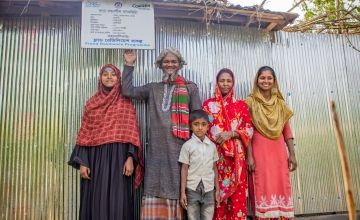
"These are painful memories"
Rebuilding life after disaster is hard, but how do you rebuild when the water returns again and again? For Nuruzzaman (52) and his wife Housenare (45), replacing livestock is expensive and replanting crops takes time. In the meantime, the children must eat.
Two-thirds of Bangladesh lies below sea level, and up to 30% of the country is flooded during the annual monsoon season, destroying crops, shelter, and lives. Every four or five years, even more severe flooding covers 60% of Bangladesh – a national disaster in every sense.
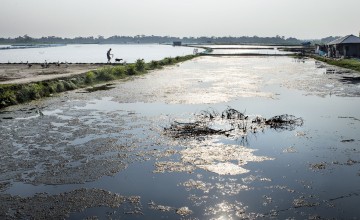
“The flooding used to come suddenly because we had no early warning. Once, I was sleeping when a flood came, and in the morning I found that all the chickens were dead. It was a huge problem. These are painful memories.”
The world’s poorest are most vulnerable to the effects of climate change. As natural disasters increase in frequency and severity, people like Nuruzzaman must adapt in order to survive. Adaptation, the difference between a natural disaster and a natural event, can be expensive however, or require technical expertise held elsewhere.
The Zurich Flood Resilience Programme
The most effective adaptation against flooding is simple in concept: Raising homes, crops, livestock, and infrastructure above the flood line. As part of the Zurich Flood Resilience Programme, The Z Zurich Foundation and Concern Worldwide have raised Nuruzzaman’s family plot on a concrete plinth, ensuring that the family and their assets remain safe when the inevitable flooding arrives.
“Things have changed now that the plinth has been raised, there's no problem. And if there is a huge flood and if someone has no shelter and is underwater, then we will be happy to invite them to come to take shelter in this house.”
The programme has also invested in shared community infrastructure. There is now a road that sits six feet above the flood line. Before, the community struggled to remain inter-connected during the four to six months of annual flooding. New water pumps have been installed on raised concrete platforms, ensuring access to clean water.
Over 80,000 Bangladeshis are supported by the Z Zurich Flood Resilience Programme.
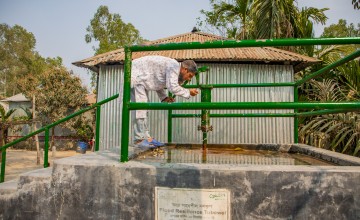
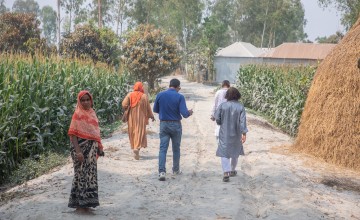
A place to share knowledge
Nuruzzaman’s crops are now growing in raised gardens, the vegetables flowering safely seven feet from the ground. The harvest, the difference between self-sufficiency and poverty, is no longer threatened by flooding. The height of the garden is not the only notable feature, Nuruzzaman is also growing a new crop: pumpkin.
Nuruzzaman learned about pumpkin, a nutritious fruit that thrives despite the changing climate, in a self-help group established by the Zurich programme. Concern provided the seeds. To complement the investments in physical infrastructure, Zurich and Concern organised the self-help group for community members to share knowledge and prepare collectively for flooding.

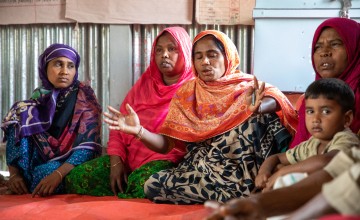
The self-help group consists of 17 local members, who represent 1,700 households in the district. Techniques and learnings are shared, such as how to save livestock during flooding, how to use local materials to prevent soil erosion, and how to build bamboo bridges. The group also operates an early-warning system, using megaphones supplied by Concern.
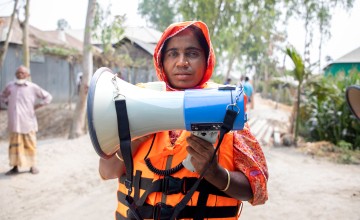
"Concern provided the money and the training. Now, I need the luck."
Nuruzzaman is generous with his crops, and with his knowledge: “If someone is in need of a vegetable, I provide. I have distributed seeds to the neighbours free of charge. So the benefit continues. When somebody comes for a pumpkin I say; ‘you can take one or two free, of course, but on one condition – you will plant the seed next year, and you will also distribute to other community members.’ If I give these things to neighbours, then God will be giving me more.”
With the future of his family on firmer, dry ground, Nuruzzaman is expanding his crop. He has planted 36 bitter nut trees, nine mango trees, and three jackfruit trees. Each tree an opportunity, and a learning curve.
“Concern provided the money and training, and now I need the luck. Mango trees are hard to grow.”
Success or fail, Nuruzzaman will share the story of his trees, his knowledge spreading like a seed.




